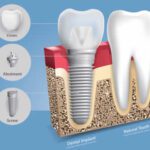The Basics: Understanding Dental Implants and Their Benefits
Dental implants are artificial tooth roots that are placed into the jawbone to support a replacement tooth or bridge. They are an excellent option for those who have lost one or more teeth due to injury, decay, or periodontal disease. Unlike traditional dentures or bridges, dental implants are permanent and look and feel like natural teeth.
The benefits of dental implants go beyond just aesthetics. They can also help maintain the structure of your face, prevent bone loss in your jaw, and improve your ability to eat and speak properly.
The Importance of Long-Term Care for Dental Implants
While dental implants offer many benefits, they require proper care in order to last a lifetime. Long-term care is essential to ensure the health and longevity of your implants. Without regular maintenance, complications such as gum disease or implant failure can arise.
Taking care of your dental implants involves daily oral hygiene practices such as brushing and flossing regularly along with regular check-ups with your dentist. It’s important to work closely with your dentist on developing a customized maintenance plan that addresses any concerns you may have based on the specific needs of your implant(s).
It’s also important to take into consideration lifestyle factors that could affect the health of your implant(s), such as smoking cessation (if applicable), diet choices, overall oral hygiene practices etc. By prioritizing long-term care for your dental implants you can enjoy all their benefits without worrying about their longevity over time.
Daily Care for Dental Implants
Brushing techniques and recommended toothbrushes
Brushing your teeth twice a day is essential to maintain good oral hygiene. However, it becomes more crucial when you have dental implants. It is also essential to brush them gently using a soft-bristled brush.
A hard-bristled brush can scratch the implant surface, which leads to bacteria build-up and plaque formation. To prevent this from happening, it’s best to use an electric toothbrush as they are gentler than manual toothbrushes.
Flossing and interdental cleaning tools
Flossing should be done regularly but gently around the implant sites as well as other teeth. It is important not to snap the floss through or pull too hard on it around your implant site as it can cause damage or dislodge the implant crown.
Interdental brushes are other useful tools that can be used instead of flossing in some cases. Interdental brushes come in different sizes, so it’s important to use the right size for your specific spaces.
Mouthwash and other products to maintain oral hygiene
Mouthwashes can help remove bacteria that cannot be reached by brushing or flossing alone, but not all mouthwashes are created equal! Some contain alcohol and other harsh ingredients which can irritate your gums or damage your implants over time.
Instead look for an antibacterial mouthwash that does not contain alcohol or harsh chemicals like chlorine dioxide. In addition to these three daily care techniques, there are also other products available that can help maintain oral hygiene such as fluoride gels, which help strengthen teeth and prevent cavities; tongue scrapers which help remove bacteria from the surface of the tongue; and gum stimulators that promote healthy gum tissue around implants.
Remember that good dental hygiene is essential to keep your implants healthy and looking great. By incorporating these daily care techniques into your routine, you can ensure the longevity of your dental implants for years to come.
Diet and Lifestyle Considerations
Foods to Avoid or Limit to Prevent Damage to Implants
When it comes to dietary considerations for dental implant care, certain foods should be avoided or limited due to their potential impact on implants. Hard and crunchy foods, such as nuts or hard candy, can put undue pressure on implants and cause damage over time.
Sticky and chewy foods, such as caramel or taffy, can also be problematic as they can adhere to the implant surface and cause bacteria buildup. Additionally, acidic foods and drinks (e.g., citrus fruits or soda) can contribute to erosion of the protective enamel layer of teeth, which in turn leaves the implant more vulnerable to damage.
Smoking Cessation and Its Impact on Implant Longevity
Smoking is a major contributor to oral health problems in general, but it has a particularly negative impact on dental implants. Smoking slows down the healing process post-surgery which could prolong osseointegration – where the implant fuses with the jawbone – which is critical for long-term success of dental implants. Smoking causes bone loss too which makes it more difficult for patients who still choose smoking after implant placement because they are making their own maintenance plan more complicated.
Regular Exercise and Its Impact on Overall Oral Health
While exercise may not seem like an obvious consideration when it comes to dental implant care, regular physical activity has been shown to have positive effects on overall oral health. Blood flow is increased during exercise that helps keep your gums healthy by reducing inflammation (which can lead to gum disease) while simultaneously increasing saliva production that helps prevent tooth decay by neutralizing acids produced by bacteria in plaque. Even something as simple as brisk walking or jogging once a day will do wonders for your oral health!
Regular Check-Ups
The Importance of Regular Check-Ups with a Dentist
While dental implants are designed to last for many years, they do require ongoing care and maintenance to remain healthy. One of the most important aspects of this care is regular check-ups with a dental professional. These appointments allow your dentist or periodontist to monitor the health of your implants and identify any potential issues before they become more serious.
Frequency of Check-Ups and What to Expect During Appointments
The frequency of check-ups will depend on your individual needs and the recommendations provided by your dental professional. In general, most patients will require at least two check-ups per year, although some may need more frequent appointments if they have specific risk factors for implant failure.
During these appointments, your dentist or periodontist will perform a comprehensive examination of your mouth, including an assessment of the condition of your gums and jawbone. They may also take x-rays or other imaging studies to further evaluate the health and stability of your implants.
In addition to these diagnostic tests, you can expect your dental professional to provide guidance on how best to care for your implants at home. This may include tailored advice on brushing techniques, flossing methods, and other strategies that can help you maintain optimal oral health between visits.
By following these recommendations and attending regular check-ups with a dental professional, you can minimize the risk of complications related to dental implants. With proper care and attention over time, you can enjoy all the benefits that come with this advanced tooth replacement option – including improved function, enhanced aesthetics, and greater confidence in everyday life.
Potential Complications with Dental Implants
Common complications that may arise over time
While dental implants have a high success rate, complications can occur over time that may affect their longevity. One of the more common issues is peri-implantitis, which is an infection of the tissue surrounding the implant.
Other complications include implant fracture or loosening, nerve damage, and bone loss around the implant site. It’s important to be aware of these potential issues and take steps to prevent them through proper oral hygiene and regular check-ups with your dentist.
How to identify warning signs of potential issues
Regular self-checks are important in identifying any potential issues with your dental implants. If you notice redness, swelling or tenderness around the implant site, it could be a sign of peri-implantitis. Pain or discomfort when biting down on food could indicate implant fracture or loosening.
Numbness or tingling sensation in the surrounding area could suggest nerve damage. If you experience any of these symptoms, it’s important to seek medical attention right away to prevent further complications from occurring.
It’s also important to keep up with regular check-ups with your dentist as they will be able to identify any underlying issues before they become major problems. During these appointments, your dentist will perform a thorough exam and potentially order x-rays or other imaging tests to ensure everything is functioning properly.
While dental implants are a great way to replace missing teeth and improve overall oral health, it’s important to be aware of potential complications that may arise over time. By taking steps such as proper daily care for your implants and regular check-ups with your dentist, you can help ensure their longevity and maintain optimal oral health for years to come.
Long-Term Maintenance Plan for Dental Implants
Customized maintenance plan based on individual needs
Once you have dental implants, it’s critical to have a long-term maintenance plan to ensure their longevity. Every individual’s dental needs are different, so it’s essential to have a personalized care plan created by your dentist or periodontist.
They’ll evaluate your oral health and the condition of your implants to create a customized care system that works best for you. This maintenance plan will include daily cleaning and hygiene habits, such as brushing, flossing, and using mouthwash or other prescribed products.
Importance of following the maintenance plan for optimal implant health
Following your personalized long-term maintenance plan is crucial for maintaining optimal implant health. Adhering to this program can help avoid complications that could lead to further issues down the road.
When creating your program, be sure to discuss any current oral hygiene habits with your dentist or periodontist so they can tailor recommendations based on what you’re already doing well. Be willing to make any adjustments needed based on their advice.
Your dentist may recommend certain products like interdental brushes that may work better than traditional flossing in removing plaque buildup around implants. It’s important not to skip visits with your dentist or periodontist since they will identify potential issues early on and take steps needed like deep cleanings in order to keep implants healthy.
The bottom line? If you want long-lasting dental implant results that look and feel natural while lasting many years, establish a regular routine of good oral hygiene practices from day one – AND stick with them!
Do you live in Bingham Farms or the surrounding area? Our team is ready to help you achieve your smile goals. Schedule your appointment today.



